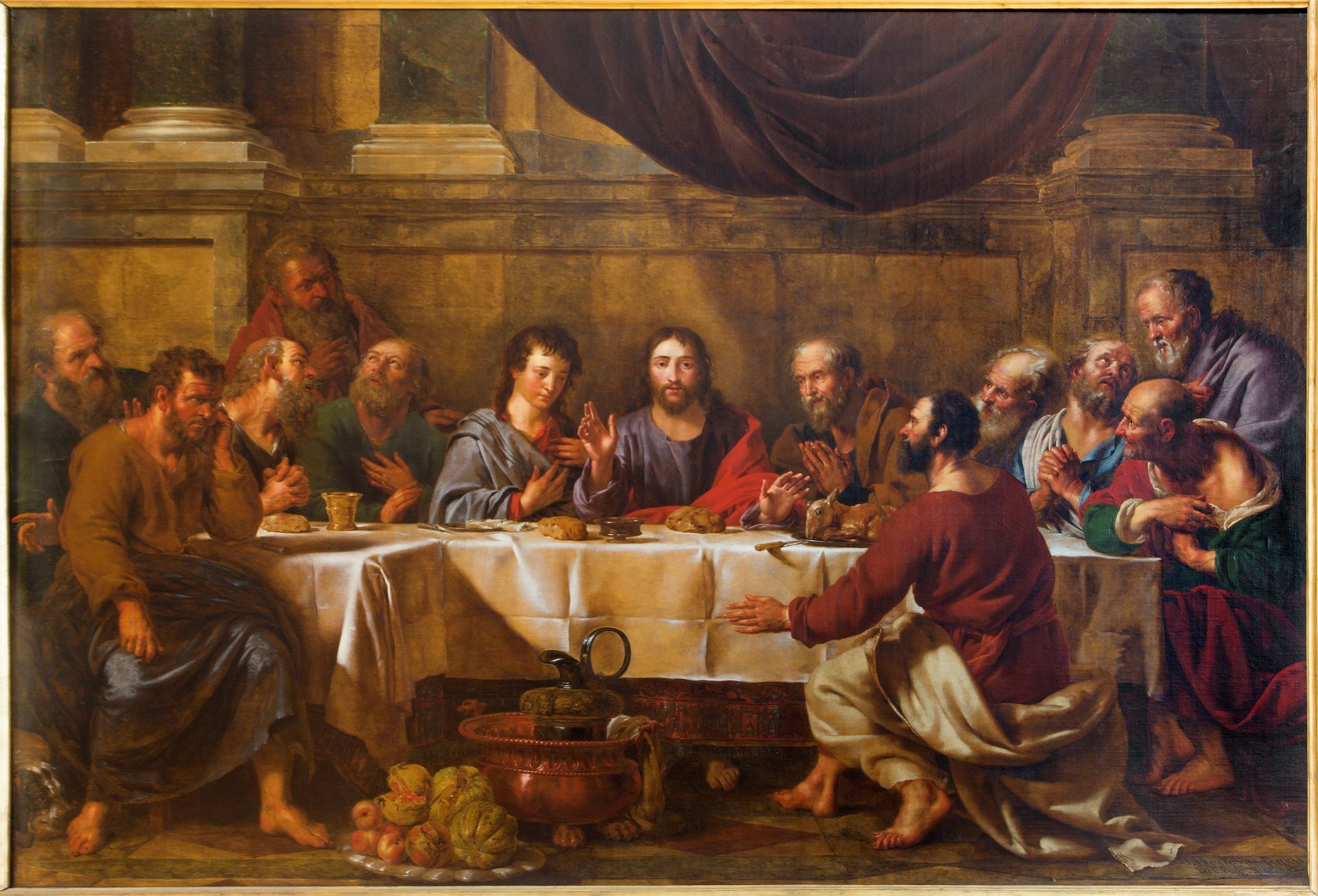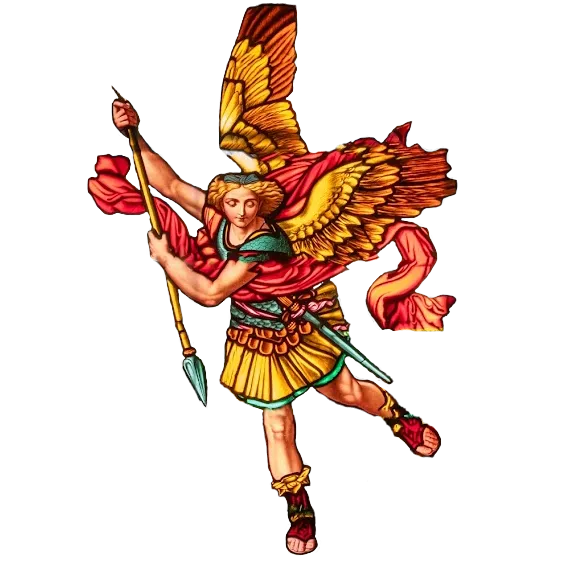Eucharist
Jesus said to them, "Amen, amen, I say to you, unless, you eat the flesh of the Son of Man and drink his blood, you do not have life within you." (John 6: 53)
What is the Holy Eucharist?
The Holy Eucharist, in which the faithful receive the Body and Blood of Christ, is the ultimate sign of our sharing in the divine life of Christ as well as of our status as one Body in Christ.
In the Gospel of Saint John, Christ identified himself as "the bread that came down from heaven"(John 6:41). At the Last Supper he took the bread and the cup filled with wine and said, "This is my body....This is my blood of the covenant" (Matthew 26:27-28).
Each time a bishop or priest repeats these words of consecration in the Mass, the substance of the bread and wine is changed into the Body and Blood of Christ by the power of the Holy Spirit. (Cf. CCC 1365,1374,1376)
Because the members of the Church are one Body in Christ, we partake of the one bread, the Body of Christ, in the Eucharist, "the fount and apex of the whole Christian life" (LG 11). Holy Communion is thus a rich symbol of our unity in Christ and of Christ's presence dwelling within us. (Cf. CCC 805, 1384, 2120)
Christ's words in instituting this Sacrament at the Last Supper were unequivocal:
"This is my body...This cup is the new covenant in my blood."
(Luke 22: 19-20)
The Church teaches that Jesus is truly, really, and substantially present-in His Body, Blood, Soul and Divinity-in the Eucharist. The Church has always recognized Christ's Real Presence in the Eucharist.
The bread and wine consecrated by the bishop or priest in the Liturgy of the Eucharist become the Body and Blood of Christ. The priest, through the power of his ordination and the action of the Holy Spirit, transforms the bread and wine into the Body and Blood of Jesus. This change in the Eucharistic species in which the substance of the bread and wine become the Body and Blood of Christ is called transubstantiation.
In the Eucharist, Christ remains truly and totally present under the appearances of bread and wine. He offers his Body and Blood to us in Holy Communion to be nourished by his divine life. The Eucharist is, therefore, not merely a symbol of Christ's presence but also the active presence of Christ himself, who gives himself to us unconditionally so our lives might be united to his life intimately. (Cf. CCC 1323-1325)
Jesus said to them, "Amen, amen, I say to you, unless you eat the flesh of the Son of Man and drink his blood, you do not have life within you. Whoever eats my flesh and drinks my blood has eternal life, and I will raise him on the last day. For my flesh is true food, and my blood is true drink. Whoever eats my flesh and drinks my blood remains in me and I in him." John 6:53-56
What is this Sacrament Called?
The inexhaustible richness of this sacrament is expressed in the different names we give it. Each name evokes certain aspects of it. It is called:
Eucharist, because it is an action of thanksgiving to God. The Greek words eucharistein and eulogein recall the Jewish blessings that proclaim - especially during a meal - God's works: creation, redemption, and sanctification.
The Lord's Supper, because of its connection with the supper which the Lord took with his disciples on the eve of his Passion and because it anticipates the wedding feast of the Lamb in the heavenly Jerusalem.
The Breaking of Bread, because Jesus used this rite, part of a Jewish meat when as master of the table he blessed and distributed the bread, above all at the Last Supper. It is by this action that his disciples will recognize him after his Resurrection, and it is this expression that the first Christians will use to designate their Eucharistic assemblies; by doing so they signified that all who eat the one broken bread, Christ, enter into communion with him and form but one body in him.
The Eucharistic assembly (synaxis), because the Eucharist is celebrated amid the assembly of the faithful, the visible expression of the Church.
The
memorial of the Lord's Passion and Resurrection.
The Holy Sacrifice, because it makes present the one sacrifice of Christ the Savior and includes the Church's offering. The terms holy sacrifice of the Mass, "sacrifice of praise," spiritual sacrifice, pure and holy sacrifice are also used, since it completes and surpasses all the sacrifices of the Old Covenant.
The Holy and Divine Liturgy, because the Church's whole liturgy finds its center and most intense expression in the celebration of this sacrament; in the same sense we also call its celebration the Sacred Mysteries. We speak of the Most Blessed Sacrament because it is the Sacrament of sacraments. The Eucharistic species reserved in the tabernacle are designated by this same name.
Holy Communion, because by this sacrament we unite ourselves to Christ, who makes us sharers in his Body and Blood to form a single body. We also call it: the holy things (ta hagia; sancta) - the first meaning of the phrase "communion of saints" in the Apostles' Creed - the bread of angels, bread from heaven, medicine of immortality, viaticum. . . .
Holy Mass (Missa), because the liturgy in which the mystery of salvation is accomplished concludes with the sending forth (missio) of the faithful, so that they may fulfill God's will in their daily lives.
-Catechism of the Catholic Church, paragraphs 1329-1332
What are the origins of the Eucharist?
The origins of the Eucharist are found in the Last Supper that Jesus shared with his Apostles.
The Lord, having loved those who were his own, loved them to the end. Knowing that the hour had come to leave this world and return to the Father, in the course of a meal he washed their feet and gave them the commandment of love.
In order to leave them a pledge of this love, in order never to depart from his own and to make them sharers in his Passover, he instituted the Eucharist as the memorial of his death and Resurrection, and commanded his apostles to celebrate it until his return; "thereby he constituted them priests of the New Testament." (Council of Trent(1562):DS1740)
-Catechism of the Catholic Church, paragraph 1337

About the Eucharist with Word on Fire
In the following three videos, Bishop Robert Barron discusses the Eucharist as a Meal, as a Sacrifice and as Real Presence.
Bishop Robert Barron is an author, speaker, theologian, and founder of Word on Fire, a global media ministry. Word on Fire reaches millions of people by utilizing the tools of new media to draw people into or back to the Catholic Faith.
The Eucharist as a Sacrafice
The Eucharist as Real Presence

Contact us:
Saint Michael the Archangel Parish
21 Manning Street
Hudson, MA 01749
Phone: (978) 562 - 2552
Priest: Father Giombetti
Director of Operations: Kaitlyn Hopper
Business Manager: Marcy Flaherty
Pastoral Assistant: Lori Morton